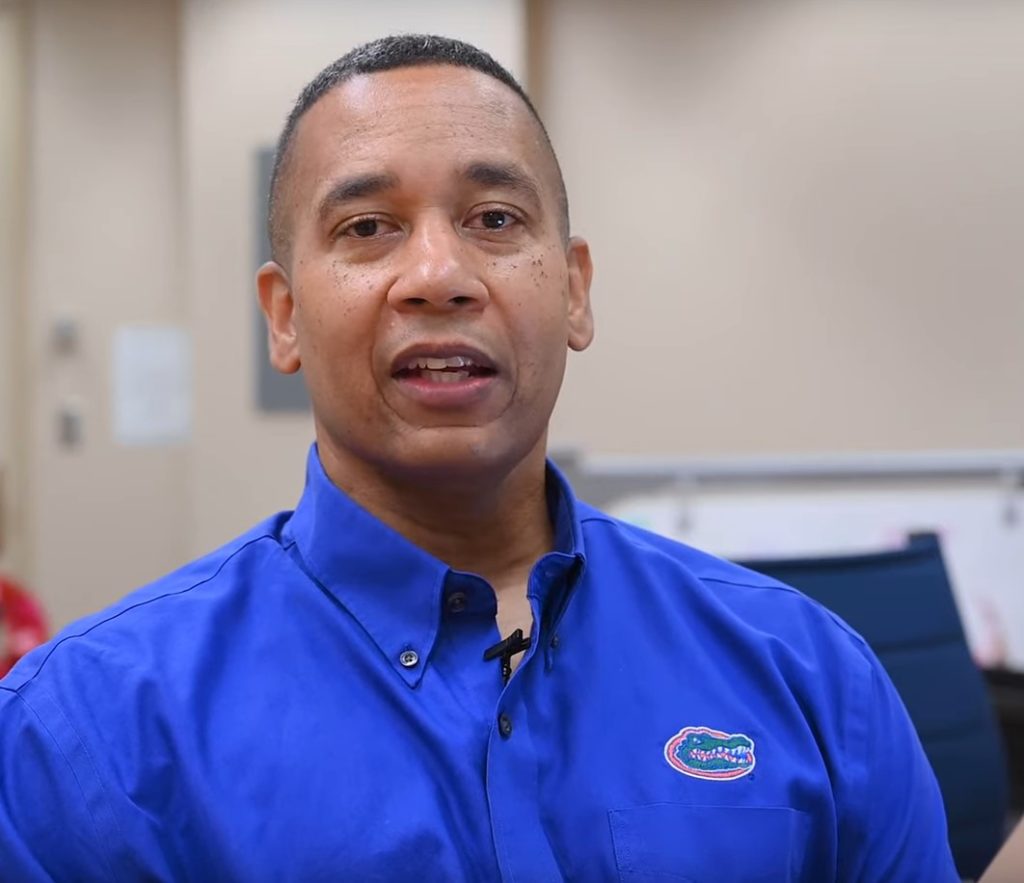Skip the Line for Safer Voting, Vaccinations, or Other Activities with inLine Ticketing
UF researcher awarded “Invention of the Year” for his ticketing system during COVID-19
The year 2020 was unprecedented in many ways. It was the year of the COVID-19 pandemic and record voter turnout for elections in the United States.
One socially-minded researcher at UF saw the crossroads of these issues, and decided to do something to keep poll workers and voters safer while casting their ballots. Dr. Juan Gilbert, The Banks Family Preeminence Endowed Professor and chair of the UF Department of Computer & Information Science & Engineering (CISE), saw the potential danger of standing in line to vote during the election and was inspired to create the inLine Ticketing system.
“I thought, ‘Is there a way to mitigate this situation and make it safer?’” said Gilbert. “So I came up with this idea for a ticketing system whereby individuals would be given tickets that would tell them a time to return to vote so they didn’t have to stand in line and potentially compromise their health.”

The software, inLine Ticketing, was released before the 2020 presidential election online for free so that any person with access to the internet and a computer could download and use it. It was easy to use. All a poll worker needed to do was estimate the average time a person was spending in the voting box and choose how many tickets needed to be generated.
One invention, many applications
Although developed initially to lower potential COVID-19 exposure at polling sites, the software has a number of other uses. For example, inLine Ticketing can be used to provide information to people waiting in long lines for admission to large events or for those waiting in line to be vaccinated.
“Dr. Gilbert has invented a ticketing system that routes the traffic for lines. The idea behind it is that if you know when your time is to buy your ticket, get your inoculation, or vote, it’s a more comforting feeling than waiting in a long line not knowing when your turn will come,” said Richard Croley, licensing officer at UF Innovate who has worked with Gilbert to license numerous technologies.
Gilbert and the innovation received high praise from UF Innovate by receiving one of seven Invention of the Year awards. UF Innovate recognized InLine Ticketing because of the technology’s clear positive impact to improve safety during the COVID-19 pandemic.
This is only the most recent invention by Gilbert aimed at solving a real-world issue in a real-world context. He is known at UF Innovate for developing technologies such as inLine Ticketing that are built to make the world a better place. Since being recruited to join the University of Florida as chair of the CISE Department in 2014, Gilbert has worked with UF Innovate to license world-bettering technologies.
“An artist wants to communicate a message in their medium, and inventors are like that. They want to create something. Gilbert wants to create innovations that provide a benefit to the world,” said Croley when asked about his history working with the researcher.
Solving real world problems
While working with Croley, Gilbert has disclosed a number of inventions including the patented Prime III voting system. Following the 2002 passing of the Help America Vote Act, Gilbert received funding from the U.S. Election Assistance Commission to develop Prime III. The software interfaces with voting machines to make voting accessible to all people, including people with visual impairments. Since then, Gilbert has updated the software so that for each digital vote, a corresponding paper ballot is printed for security and authenticity.
“Prime III is the first open-source voting technology to be used in the United States in state, federal, and local elections,” said Gilbert.
InLine Ticketing and Prime III are just two of the many world-improving inventions that have come out of The Human-Experience Research Lab lead by Gilbert.
“The work we do is at the intersections of people, technology, policy, and culture. We build innovative solutions to real-world problems by integrating all of those,” Gilbert said. “The work is very applied and has societal implications because we address real-world problems in real-world contexts with real-world people.”
The lab has a long history of working in the mix of these issues. Most recently, the focus for Gilbert’s research group has been to improve election technology, accelerate brain-computer interfacing (controlling computer actions with thoughts), and increase safety at traffic stops. Reduced bias in technology is another key area of research for the lab.
“We have a number of projects on AI and machine learning with respect to bias,” said Gilbert. “Can we make those algorithms and techniques less biased and more fair?”
While leading the Human-Experience Research Lab, Gilbert has interfaced often with UF Innovate | Tech Licensing. Like many inventors who license technologies at UF, he believes that technology licensing and disclosure are critical requirements for protecting intellectual property and for enabling research to have broader impacts.
“It is a very big deal here at UF. After all, we invented Gatorade,” said Gilbert. “Technology licensing and transfer are a major part of who we are as Florida Gators.”
Sarah Anderson Weaver is a marketing intern with UF Innovate | Tech Licensing. She is also a Ph.D. candidate in the Department of Entomology and Nematology at the University of Florida where she conducts research assessing the impacts of climate warming and land-use change on native pollinators. She has a B.A. in English – Creative Writing and a B.S. in Environmental Studies from the University of Kansas. She is a passionate proponent of science communication, and she is interested in pursuing a career in technical writing or technology transfer after completing her doctoral degree.
